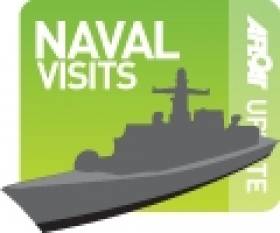Displaying items by tag: Emerclass
Navies Northern Adventure Head for 'Foyle Days'
On the naval front, LE Emer was built in Cork's Verolme Dockyard in 1978. She represents the oldest of the eight-strong fleet and is designed from the Naval Service's first purpose built patrol vessel OPV LE Deirdre (P20) but was modified to improve her stability and speed. This vessel was decommissioned several years ago and was converted into a private yacht.
The original BOFORS 40mm L60 gun of the LE Emer was recently upgraded to a BOFORS 40mm L70 to improve range and accuracy of her main armament. She alongside her 65m sisters LE Aoife (P22) and LE Aisling (P23) where all built primarily to patrol the Irish section of the European Economic Zone (EEZ).
During their careers the 'Emer' class vessels have also completed numerous re-supply missions to Irish troops serving overseas with the United Nations and in particular in the Lebanon. A crew compliment of 46 (5 officers) operate the vessels which are all now in their fourth decade of service.
OPV HMS Severn is the third of four 'River' class offshore patrol vessels and like her Irish counterpart is deployed on fishery duties. The 1,677 displacement tonnes vessel was built in 2001 in the UK'S south coast port of Southampton at Woolston Docks. Her home port for the 30 crew is at HM Naval Base in neighbouring Portsmouth.
She becomes the fifth ship to bear the name and with sisters HMS Mersey (P 282) and HMS Tyne (P 281) they are assigned to the Fishery Protection Squadron. Click the ship's diary to follow the ship news. The final member of the River class HMS Clyde (P 257) serves as a Falklands Islands Patrol Vessel (FIPV).
- yacht
- Clipper Round The World Race
- naval service
- Derry
- Royal Navy
- Londonderry
- Ports and Shipping News
- JOHANNA LUCRETIA
- Verolme Cork Dockyard
- United Nations
- Foyle Days
- Offshore Patrol Vessel
- Maritime Festivals
- LE Emer
- Emerclass
- LE Deirdre
- HMS Mersey
- Riverclass
- Schooner
- HM Naval Base Portsmouth
- Falklands Islands





























































